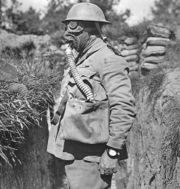.gif)
Edward Harrison (chemist)
Encyclopedia

Order of St Michael and St George
The Most Distinguished Order of Saint Michael and Saint George is an order of chivalry founded on 28 April 1818 by George, Prince Regent, later George IV of the United Kingdom, while he was acting as Prince Regent for his father, George III....
(1869–1918) was a British chemical scientist, credited with the invention of the first serviceable gas mask
Gas mask
A gas mask is a mask put on over the face to protect the wearer from inhaling airborne pollutants and toxic gases. The mask forms a sealed cover over the nose and mouth, but may also cover the eyes and other vulnerable soft tissues of the face. Some gas masks are also respirators, though the word...
during World War I
World War I
World War I , which was predominantly called the World War or the Great War from its occurrence until 1939, and the First World War or World War I thereafter, was a major war centred in Europe that began on 28 July 1914 and lasted until 11 November 1918...
.
At the age of 14, Harrison was apprenticed to a pharmacist, at the end of which he was awarded the Royal Pharmaceutical Society's
Royal Pharmaceutical Society of Great Britain
The Royal Pharmaceutical Society of Great Britain was formerly the statutory regulatory and professional body for pharmacists and pharmacy technicians in England, Scotland and Wales...
Jacob Bell Scholarship. As a student, he was awarded medals in chemistry, botany and materia medica. He qualified as a pharmaceutical chemist in 1891, becoming a demonstrator in the Society's laboratory and school. He later became head of the analytical laboratory at Burroughs & Wellcome, and assisted in the compilation of the British Pharmaceutical Codex
British Pharmaceutical Codex
The British Pharmaceutical Codex was first published in 1907, to supplement the British Pharmacopoeia which although extensive, did not cover all the medicinal items that a pharmacist might require in daily work...
.
At the outbreak of World War I, Harrison tried to enlist in the British army, but was rejected on account of his age (45 at the time), but was accepted as a corporal into a "sportsman's battalion" in 1915. However, after the first use of gas weapons by the German Army in 1915, the British War Office
War Office
The War Office was a department of the British Government, responsible for the administration of the British Army between the 17th century and 1964, when its functions were transferred to the Ministry of Defence...
enlisted chemists, including Harrison, to find a way of defending against such weapons.
Harrison produced the large box respirator, the first serviceable British gas mask., and continued to work tireless for the remainder of the war. His continued improvements saw him repeatedly promoted, reaching the rank of Lt Col in the Royal Engineers. Harrison died of pneumonia at 47, one week before Armistice Day
Armistice Day
Armistice Day is on 11 November and commemorates the armistice signed between the Allies of World War I and Germany at Compiègne, France, for the cessation of hostilities on the Western Front of World War I, which took effect at eleven o'clock in the morning—the "eleventh hour of the eleventh day...
.
In a letter to his widow, the Minister of Munitions
Minister of Munitions
The Minister of Munitions was a British government position created during the First World War to oversee and co-ordinate the production and distribution of munitions for the war effort...
, Winston Churchill
Winston Churchill
Sir Winston Leonard Spencer-Churchill, was a predominantly Conservative British politician and statesman known for his leadership of the United Kingdom during the Second World War. He is widely regarded as one of the greatest wartime leaders of the century and served as Prime Minister twice...
, wrote "It is in large measure to him that our troops have been given effectual protection from the German poisonous gases"., and that he would have been promoted to Brigadier-general in charge of all chemical warfare .
Harrison had been awarded the French Légion d'honneur
Légion d'honneur
The Legion of Honour, or in full the National Order of the Legion of Honour is a French order established by Napoleon Bonaparte, First Consul of the Consulat which succeeded to the First Republic, on 19 May 1802...
, was made a member of Italy's Order of St Maurice and St Lazarus
Order of Saints Maurice and Lazarus
The Order of Saints Maurice and Lazarus is an order of chivalry awarded by the House of Savoy, the heads of which were formerly Kings of Italy...
, and was buried with full military honours.
The Edward Harrison Memorial Prize
Edward Harrison Memorial Prize
The Edward Harrison Memorial Prize was awarded by the Royal Society of Chemistry to a British chemist who was under 32 years, and working the fields of theoretical or physical chemistry...
of the Royal Society of Chemistry is named in his honour.

